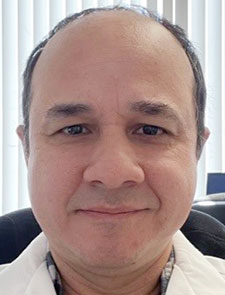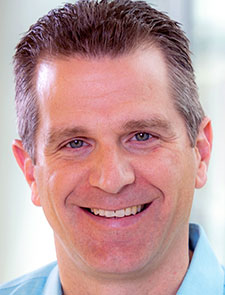 The number of hospital medicine fellowships has grown over the years. At last count, there were three administrative fellowships, 40 internal medicine fellowships, 13 family practice fellowships, and 26 pediatric fellowships listed on the SHM website.
The number of hospital medicine fellowships has grown over the years. At last count, there were three administrative fellowships, 40 internal medicine fellowships, 13 family practice fellowships, and 26 pediatric fellowships listed on the SHM website.

Dr. Ramos
The UC San Diego (UCSD) Division of Hospital Medicine Fellowship program grew from a junior faculty mentoring program that was offered to new hires early in their careers, said Pedro Ramos, MD, FHM, program director, and internist. “Although the program worked well for mentoring, we found that the clinical workload for new hires made it difficult to get a foothold into QI [quality improvement], medical education, and other aspects of working in an academic environment.”
The program began in 2020 with one fellow who has since remained with the division. The program is mostly self-funded by the clinical work the fellow does, Dr. Ramos said. “Our fellow works as a 0.5 clinical FTE [full-time equivalent] with a slight reduction that we use to pay for various courses and projects they do in the non-clinical time.”
Academic training is an important piece of the UCSD program. “Part of the training is making sure that we develop a fellow who can be well-matched and suited for academic positions elsewhere,” he said. For example, the fellow takes courses in Clinical Research Enhancement through a Supplemental Training program. “There are courses in statistics, how to understand clinical research, and even how to improve their scientific writing skills,” Dr. Ramos said. The Business and Entrepreneurship Acumen in Medicine business-school collaboration gives the fellow a look into the business side of medicine.
The fellow at UCSD creates an individual plan for the year and is placed on multiple committees and is assigned various projects and teaching responsibilities. “We want the fellow to explore different areas of hospital medicine, from teaching various learner levels both in a clinical and non-clinical environment, QI projects of different scales, mentoring, and business,” Dr. Ramos said. The program is also considering adding point-of-care ultrasound certification.
“[The program] gives the early career hospitalist an opportunity to develop skills needed for a career in academic medicine without being overburdened with clinical work,” Dr. Ramos said. “It allows them to explore different possibilities in hospital medicine so that they can better understand and define their career path.”
There are also fellowships for advanced practice providers (APPs).
Starting as a “generalist” in hospital medicine for new advanced practice providers (APPs) can be overwhelming, with patients having a broad spectrum of comorbidities, illnesses, and undifferentiated complaints. “First-year hospital medicine APPs who don’t get postgraduate training will say they are drowning at first. There are so many diagnoses and things to know,” said Brian Wolfe, MD, associate professor at the University of Colorado School of Medicine in Aurora, Colo.

Dr. Wolfe
Dr. Wolfe is also the director of the school’s Advanced Practice Fellowship (APF) in hospital medicine, one of the first such programs in the country. He and others say hospital medicine fellowships increase the competence—and confidence—of hospitalists and hospital medicine, nurse practitioners (NPs), and physician assistants (PAs).
The fellowship programs also help retain these key employees. “Most NPs and PAs don’t go through postgraduate training, but [the fellowship] has allowed many of them to obtain a level of competence they might not have had on their own or certainly not so early in their careers,” Dr. Wolfe said. “I think the fellowship has vaulted many folks along in their careers.”
High APP turnover is often due to decreased feelings of competence and confidence during their transition from trainees to medical practitioners, said researchers who surveyed 11 APP fellowships in hospital medicine in 2018 and published their findings in the Journal of Hospital Medicine.1 “APPs who have completed fellowships feel more confident and able to succeed in their field.”
Data suggest a more successful transition to practice, with greater retention for APPs who have gone through these programs, said Radha M Denmark, a hospital medicine nurse practitioner and director of advanced practice education and professional development at the University of New Mexico (UNM), in Albuquerque. UNM has had its own fellowship program since 2019.
Details of the programs
The University of Colorado’s APF in hospital medicine program began in 2009. Since that time, the 13-month program has graduated more than 98 fellows. Although the fellows are not guaranteed employment and are not required to stay at the hospital system after graduation, Dr. Wolfe, who took over the program in 2012, said the system has been able to train internally and retain 90% of its ideal candidates. “It’s a 13-month vetting process as opposed to hiring someone based on a couple of interviews.”
In this program, the junior fellows spend time on general medicine clinical experience and core medicine didactics. They start with a few patients and add to the number as they gain experience. Then they move into the intermediate phase of enhancing their skills and working with inpatient specialties. In the second part of the fellowship, senior fellows spend time training their junior counterparts. “That pushes their growth and allows them to expand their knowledge,” Dr. Wolfe said.
The program was tweaked continuously over the years but has settled in since 2019. One of the major changes has been implementing structured teaching rounds, Dr. Wolfe said. Every morning, fellows present patients to faculty and get immediate feedback. “This has developed both a sense of team and a stronger relationship between our faculty and the fellows.”
Ms. Denmark and colleagues built the UNM APP program around the National Nurse Practitioner Residency and Fellowship Training Consortium accreditation standards and used the core competencies of hospital medicine as the backbone for the curriculum. She found it helpful to reach out to an experienced mentor in the process, too.
Funding for these programs can vary according to the institution, Ms. Denmark said. Some health care systems fund theirs; others are funded by the internal medicine department. “At UNM, the fellows are employed by the hospital, and then we’re credentialed through the department of internal medicine.”
The APP program provides ongoing evaluation of participants for a year, Ms. Denmark said, with overseeing faculty continually providing feedback. If a fellow struggles, the faculty can develop a remediation plan to help that fellow succeed. She is pleased that the program has helped the hospital with retention. “We’ve graduated two cohorts now, a total of four NP/PAs, and we’ve retained all of them even through the pandemic,” Ms. Denmark said. “That’s pretty remarkable.”
The case for standardization
The actual number of hospital medicine fellowships seems to be slowly growing, although that number can be hard to pin down. Ms. Demark said she has gathered a list of 16 fellowships across the country through her own research.
That doesn’t mean the programs are similar, however. The Journal of Hospital Medicine researchers found in 2018 that although the 11 advanced practice practitioner fellowship programs they surveyed used some of the same reasoning and resources to build their programs, the programs had “little standardization in terms of curriculum or assessment.”1 The article showed that on that national snapshot, “there is not a lot of standardization across these programs,” she said.
Dr. Ramos said he and colleagues are currently working with SHM to get a better understanding of what is needed at the national level for advanced training in hospital medicine. “At any given time there seem to be about 30 various hospital medicine fellowships available for MDs and a smaller group of fellowships for APPs. One of our goals is to make the connection between those looking for a fellowship to those who offer them easier to find and highlighting differences between programs.”
One possibility of standardizing the content would be through program accreditation. Accreditation is still in its early evolution for these fellowship programs, Ms. Denmark said. The National Nurse Practitioner Residency and Fellowship Training Consortium and the American Nurses Credentialing Center offer accreditation for joint NP/PA fellowship programs. The Accreditation Review Commission on Education for the Physician Assistant offers accreditation for PA programs. The American Association of Colleges of Nursing offers accreditation for NP programs.
Because of the cost and intensive process, most programs have not yet pursued accreditation. This may change if postgraduate fellowships get other funding such as from the government. “Then accreditation will be a necessary step so that all programs are adhering to the highest standards for their fellows,” Dr. Wolfe said.
If all programs were accredited, it would be easier to track how many APP fellowship programs exist in the country, Ms. Denmark said. The rigor of the programs would be similar, and data collection would be easier. Accreditation would also make creating “fellowships” that consist of a structured onboarding program with 12 weeks of education and then some one-on-one training more difficult, she said.
Advice for new programs
What about hospital systems that don’t currently have a hospital medicine fellowship program and are considering starting one? They need to examine their needs, Dr. Wolfe said. “Are they trying to train a few employees? If so, there are simpler, less time-intensive ways to have a rigorous onboarding.” He believes that a program should last at least six months, preferably a year.
“[You] don’t really start these programs for the sake of just having a program,” Ms. Denmark said. “You start them because you want to attract people to your organization or group, and you want to keep them afterward.”
“Figure out what it is that your institution does well and what you can truly offer someone,” Dr. Ramos said. “Then be patient. You want to have the right candidate for the job [for the candidate] and your program to be successful.”
Systems that want to create an educational platform also need to make sure they have a culture that supports it. “At the end of the day all your programmatic design will fall apart if you don’t have the cultural atmosphere where physicians and [advanced practice providers] are partnering to educate these fellows and help them and achieve to the top of their licenses,” Dr. Wolfe said.
Physician buy-in was difficult in the early stages of the Colorado APF program since the concept was foreign to most physicians, Dr. Wolfe said. Now new faculty physicians get hired and think the [fellows] are “awesome.” “They have really bought into the culture [now], but that did take some convincing early on.”
Faculty involvement is key to having a successful hospital medicine fellowship, Dr. Wolfe said. “At the end of the day, it comes down to how dedicated your faculty are at the bedside to clinically educate folks and push their medical decision making.”
Sue Coons is a medical writer in Chapel Hill, NC. She also has worked in the hospital patient access area for 10 years.
Reference
- Klimpl D, et al. The current state of advanced practice provider fellowships in hospital medicine: a survey of program directors. J Hosp Med. 2019;14(7):401-6.